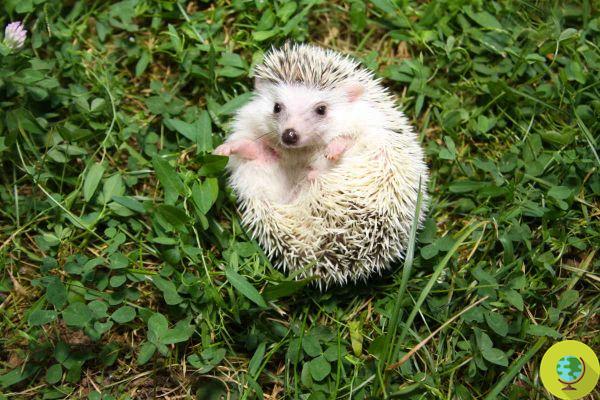 He is about to end up run over, his mother saves him
He is about to end up run over, his mother saves him
The trend of the African hedgehog as a pet is rampant, but keeping it indoors is not a good idea at all. We explain why
In recent times, an apparently harmless, yet potentially dangerous, trend has been spreading: that of keeping hedgehogs at home as is done with dogs and cats. The Instagram and TikTok homes are filled with adorable curls that are stroked and displayed on the sofa or bed, without her natural needs being taken into consideration.
It is good to clarify immediately most of those that appear on social networks are exemplary of Atelerix albiventris, or African hedgehog, whose habitat of origin is made up of savannahs and arid areas of central Africa. This exotic animal, also known as the pygmy hedgehog, is considered a pet and is not subject to CITES (the Washington Convention on International Trade in Endangered Species of Fauna and Flora).
This species is not to be confused with the common hedgehog (Erinaceus europaeus), also known as the European hedgehog. The latter is a species protected by law in our country and keeping it at home is a crime.
Read also: Hedgehogs: they are endangered. When we find one wounded, let's save him!
5 things to know about the African hedgehog before (not) adopting one
As anticipated, the African hedgehog is considered a pet. But too often those who decide to keep it at home do not pay attention to its needs. To avoid suffering, it is good to know its habits and characteristics. Here are 5 things to know about this very tender animal, whose weight ranges from 250 to 600 grams and which in captivity can live up to 10 years:
He sleeps during the day and lives at night
Atelerix albiventris is a nocturnal animal. In short, he sleeps during the day and is active during the night. It prefers to spend the days in the trunks of trees or inside the crevices of the ground, while at night it goes out to hunt worms, snails and insects that it can identify thanks to a very developed sense of smell. In captivity these animals are kept in metal cages, often without shelters in which to rest and their natural rhythm of nocturnal activity is altered by human schedules. Furthermore, the movements are very limited in the cage. Another important thing to know about this species is that it does not hibernate, unlike the European hedgehog.
It is omnivorous and in captivity tends to obesity and to develop diseases
African hedgehogs are omnivores. They feed mainly on invertebrates (including beetles, earthworms, caterpillars, millipedes, termites, ants, snails and spiders), small vertebrates (snakes, lizards, mice and frogs), but also leaves, roots and fruits. When kept in captivity, however, all too often they are not adequately fed their nutritional needs. They are often fed commercial food, used for dogs and cats and high in calories and protein. This situation leads to cases of obesity, diseases of the oral and gastrointestinal cavity and even tumors.
He is a solitary animal
The African hedgehog is by nature a very solitary animal, except in the period of courtship, courtship and reproduction.
Individuals tend to avoid each other to prevent competition - explains the LAV (Anti Vivisection League) - The meeting with conspecifics often determines competitive and defensive behaviors such as erection of thorns, vocalizations and attacks.
In captivity, however, they are often massed (especially on farms) and it is not uncommon for aggressions to occur, especially among males, cases of infanticide and even cannibalism.
It defends itself by producing a foam
Not everyone knows that African hedgehogs, in addition to curling up showing thorns, adopt a particular behavior (known as anting) when they are in the presence of substances unknown to him. In this case, this small curly mammal begins to salivate and sprinkle the body with the foam produced.
It can transmit various zoonotic diseases
Finally, African hedgehogs represent a risk that should not be underestimated for the transmission of numerous zoonotic diseases. The main infections associated with these small mammals are Salmonella and the bacterium Mycobacterium marinum, but also fungi, the rabies virus and Herpesviruses.
In light of all these elements, wouldn't it be better to leave African hedgehogs alone in their natural habitat?
Sources: advimorivet.com/LAV
Read also:
- Hamsters: 11 causes of sudden death you need to know if you adopt one (or more)
- Sugar glider: everything you need to know before (NOT) adopting one


























